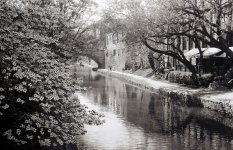I use a meter or, more recently, AE. For the vast majority of my shots, however, not having a meter wouldn't make much of a difference, because (1) I find my prior guesstimation of exposure is pretty close to what the meter ends up telling me anyway, and (2) I shoot mostly with Tri-X, which is so forgiving that you can be off by a couple stops and not lose the shot. Frankly, I think most photographers on RFF could get by perfectly well without a meter. In my experience, a meter will matter in a small handful of photography situations at the margins.
Having said all that, I find a meter--or AE, really--useful for the kind of shooting I tend to do these days, which is lots of street shooting. Under those conditions, the light levels can change dramatically when I turn a corner or cross the street to grab a shot. I live in the Norheast, where perfectly sunny, cloudless days are not the rule, so the sun darting in and out of clouds can alter light levels unpredictably. A meter helps me salvage those small handful of shots that I might otherwise lose if I didn't use one.


